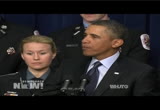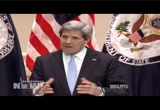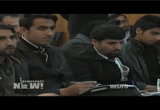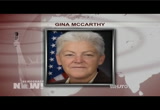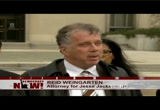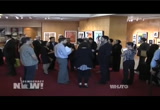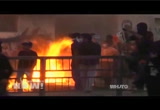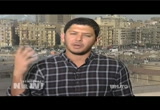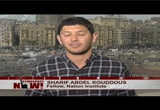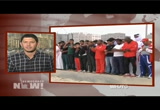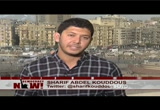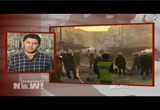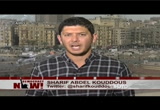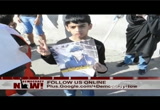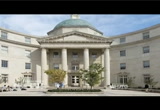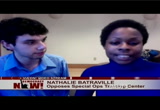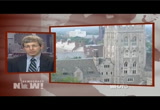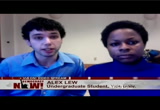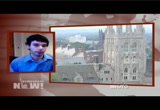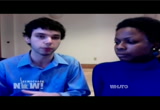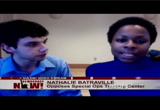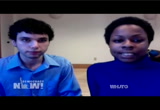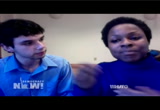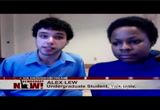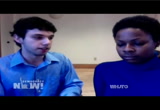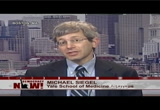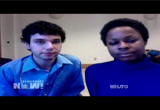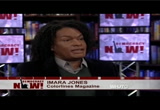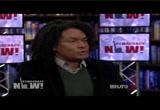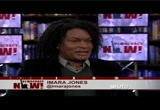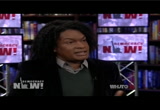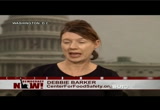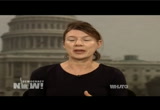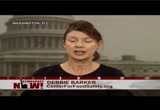tv Democracy Now WHUT February 21, 2013 6:00pm-7:00pm EST
6:00 pm
02/21/13 02/21/13 [captioning made possible by democracy now!] >> from pacifica, this is "democracy now!" >> senate republicans in congress face a simple choice. are they willing to compromise to protect vital investments in education healthcare national- security and all the jobs depend on them, or with the rather put hundreds of thousands of jobs and our entire economy at risk just to protect a few special- interest tax loopholes that only benefit the few wealthiest
6:01 pm
and tax corporations. he likes the word of the month of washington is sequestration -- automatic $85 billion in spending cuts slated to take effect on march 1 unless congress reaches a deal. what will that mean? butt bring war to campus that is the message at university opposing the pentagon funding of the proposed new research center on campus to train special operations forces in interview techniques. first, we speak to sharif abdel kouddous just back from bahrain, or the u.s.-backed monarchy continues to crack down on pro- democracy activists. all of that and more coming up. this is "democracy now!," democracynow.org, the war and peace report. i'm amy goodman. republican senator lindsey graham has revealed he says the death toll in u.s. drone war overseas. at a speech in south carolina
6:02 pm
wednesday night, he said -- his comments mark the first time a u.s. official has offered a figure for those killed in nearly a decade of u.s. drone strikes abroad. the 4700 figure matches the high end of an estimate by the bureau of investigative journalism, which extensively has covered the strikes. the news comes as the obama administration continues to stonewall members of congress on fully releasing the justice department memos explaining the legal rationale for targeted killings overseas. the white house agreed to a least partially disclose the memos earlier this month after a senate uproar amid the conformation hearings for cia nominee john brennan. but the new york times reports the administration has adopted a strategy of continuing to deny senators full access while simultaneously negotiating with
6:03 pm
republicans to reveal more information on the deadly u.s. consulate in benghazi, libya. the strategy appears focused on ensuring the white house has enough votes for brennan's's confirmation what continuing to keep details of its assassination program under wraps. the pentagon has notified its 800,000 civilian employees of likely furloughs should automatic spending cuts kick in at the end of the month. the military will lose $46 billion in funding unless president obama and congressional republicans can resolve their latest budget standoff by march 1st. in a speech at the university of virginia on wednesday, secretary of state john kerry warned the looming sequester could threaten u.s. diplomacy overseas. >> i am particularly aware that in many ways the greatest challenge to america's foreign policy today is in the hands not of diplomats, but of policy makers in congress. it is often said that we cannot be strong at home if we're not strong in the world.
6:04 pm
but in these days of a looming budget sequester that everyone actually wants to avoid -- or most -- we cannot be strong in the world unless we are strong at home. my credibility as a diplomat working out other countries, create order, is strongest when america at last put its own fiscal house in order, and that has to be now. >> we will have more on the sequester later in the broadcast. at least 31 people reportedly have been killed in a car bombing in syria's capital of damascus. the attack targeted the headquarters of syria's ruling baath party. it was of the dead were civilians, with many more wounded the nine nations of civilia casualties in afghanistan have declined for the first time in six years. at least 2754 afghan civilians were killed in 2012, a drop of 12%. director of human rights for
6:05 pm
united nations assistance mission in afghanistan linked the decline to less attacks by both militants and u.s.-led nato occupation. >> round engagements between the party cost eurhere casualties. there was a decline in suicide attacks by anti-government elements. there was a reduced number of aerial operations by international military forces, and there was measures taken by both the afghan forces and international forces to reduce harm to civilians. they actually made a change, we think, based on much of our efforts and the efforts of other afghans to work with them to minimize civilian harm. >> human rights watch is warning mexico is enduring what it calls "the most severe crisis of enforced disappearance and latin america in decades." around 150 people and maybe
6:06 pm
hundreds more have disappeared at the hands of mexico's police and military to in the six-year drug war. at least 60 of the abduction cases raised questions of police collusion with the drug cartels they're purporting to fight. human rights watch is calling on the mexican government to investigate each case and establish a thorough process for documenting deaths and disappearances. according to one government estimate, some 70,000 people have died in mexico's drug war since it was declared in 2006. president obama has reportedly decided on his second term nominee to head the environment protection agency and department of energy. reuters reports obama has tapped air quality expert gina mccarthy to replace lisa jackson at the epa. mccarthy currently serves as assistant administrator for the epa office of air and radiation. the nuclear physicist ernest moniz meanwhile is reportedly the pick to head the energy department. a former undersecretary of
6:07 pm
energy under president clinton, moniz currently heads the energy initiative at mit the group food and water watch has started a petition against his potential bid, citing his support to the gas drilling process known as hydraulic fracturing, or fracking. virginia lawmakers have approved a new measure imposing strict requirements for photo id at the polls. the bill would force voters to produce government-issued documents such as a driver's license, passport or a voter-id card in order to cast their ballots. although republican governor bob mcdonnell is expected to sign the measure into law, the justice department will have to sign off on its adoption. the voting rights act mandates federal oversight of voting laws in states with a history of disenfranchising african- americans. the fbi has launched a probe of potential insider trading in the purchase of the food giant h.j. heinz. a consortium of the firms 3 g capital and warren buffett pause berkshire hathaway acquired
6:08 pm
heinz for $28 billion earlier this week. the fbi says a number of suspicious trades took place one day before the deal was announced. former democratic congressmember jesse jackson, jr. has formally pled guilty to spending more than $750,000 in campaign funds on personal items. jackson used donations for purchases including music memorabilia and items for his home. he resigned last year after a several month leave to seek treatment for bipolar disorder. outside the courtroom, a defense attorney said jackson's condition is improving and expressed hope his record a public service will factor into his sentencing. jesse hass out that's serious health issues. many of you know about them. we're going to talk about the extensively with the courts. those health issues are directly related to his present predicament. that is not an excuse, that is a fact.
6:09 pm
jesse has turned the corner there as well, and i think there is reason for optimism here, too. i would say we are hopeful and we expect that there will be fairness in the process for person was contributed so much to his community, though -- done so much for some of people, would, and should, get credit for it. >> jesse jackson jr. will be sentenced in june. he faces up to five years in prison under his plea deal. the pentagon has launched a probe into recent magazine interview with the navy still reportedly killed osama bin laden. speaking to us or magazine, the unidentified seal clancy lost medical benefits for himself and his family after recently leaving the navy. the article quotes him saying -- he goes on to use an expletive to describe the navy's attitude
6:10 pm
toward his well-being. navy commanders have pushed back against the seals claims, saying he knowingly retired years before becoming eligible for additional benefits. military investigators are looking into whether the interview divulged classified information about the rate of some of the laden's pakistan compound. oscar-nominated palestinian filmmaker has spoken out the day after being detained and questioned at los angeles international airport along with his family. emad burnat arrived in los angeles to attend this sunday's academy awards, where he is nominated in the best documentary category for "five broken cameras." the film documents the growth of a resistance movement to the israeli separation wall in the west bank village of bil'in. emad burnat and his family were freed after the filmmaker michael moore sent out twitter messages and called lawyers to intervene. emad burnat and michael moore discuss the incident wednesday night at in event. >> when i got here yesterday, it
6:11 pm
was different treatment. they were questioning me. they were asking for more documents and more papers. i had the visa and i had the documents and i had the invitation. i had everything, but they were asking for me to give them more documents. >> i called the head of the academy and the lawyer and that an immigration lawyer, all within five minutes. then i called a friend that works in the state department and now it's probably a half hour or so later, they released him. >> you can go to democracynow.org to see the interviews. those are some of the headlines
6:12 pm
free of the this is "democracy now!," democracynow.org, the war and peace report. i'm amy goodman with juan gonzalez. >> welcome to all our listeners and viewers from around the country and around the world. we begin today's show looking at the gulf nation of bahrain, a close u.s. ally and home of the navy's fifth fleet. tensions remain high after a teenager was killed last week on the second anniversary of pro- democracy protests. since february 2011, at least 87 people have died at the hands of u.s.-backed security forces. while talks are taking place this week between the bahraini government and opposition groups, several of the nation's leading human rights defenders remain in prison. >> attorney abdulhadi al- khawaja, co-founder of the bahrain center for human rights, is serving a life sentence. nabeel rajat, another prominent human rights defender, is serving a three-year sentence. sharif abdel kouddous has just returned from bahrain. his latest article is, "scenes from a bahraini burial."
6:13 pm
he joins us from his home in cairo, egypt. and welcome to "democracy now!" talk about what you found in bahrain. how difficult was it to get in? >> i was granted at the last moment a journalist visa for three days. therefore, the uprising, the anniversary of the uprising on february 14. really, on that day and the days afterward, bahrain had the feeling of a country under occupation. there were riot police in full armor wielding tear gas, helicopters buzzing overhead conducting surveillance. there were checkpoints set up along the major roads with
6:14 pm
security forces stopping motorists, checking i.e.d.'s, sometimes keeping people for hours and harassing them. inside the villages, clashes take place with police with young men and boys throwing molotov cocktails and stones at police, usually been attacked with shotguns and suffocating them out with tear gas. you see many of these young men going toward the sides of the pearl roundabout, the roundabout destroyed by the government in the early months of the uprising in 2011. this is a combat -- recurrence symbolic action. this was the scene on the ground in bahrain. as you mentioned, a 16-year-old boy was shot and killed by
6:15 pm
police officer as eyewitnesses told me he was not more than three or 4 yards away from the police officer when he was killed. this was only fueled the unrest. his funeral two days later was attended by thousands of people holding up pictures of him, smiling picture of him, chanting things like "down with the king nexthrain" and "i'm the martyr." police cordoned off the entire area of that morning police had put roadblocks on all the major roads leading to a major area to these two villages were the funeral march would take place. there was an unforgettable scene as the march reached the graveyard and the boy's body was being lowered into the grave, protesters continued moving forward toward the pearl roundabout were dozens of
6:16 pm
security forces were waiting for them. there was tear gas being fired and people were holding tissues and gas masks over their hands and out as this body was being lowered into the ground this was the kind of scene that is in bahrain and many people lament from the opposition movement that they have been forsaken by the international community and forgotten by the world's media for this uprising that does not get a lot of attention in the media. >> sharif abdel kouddous, you mention the tear gas fired read in your article you talk about the lethal use of tear gas throughout this democracy uprising by the government forces in bahrain. could you expand on that? >> it must be mentioned large ranks of the police are recruits from other countries like pakistan, yemen, and jordan. there referred to by protesters
6:17 pm
and oppositionists as mercenaries. the security forces the government have been heavily criticized for the use of tear gas in bahrain. people speak of it as an unavoidable hazard of everyday life. physicians for human rights, u.s.-based group, released a study last to that found the government's use of tear gas was unprecedented in the world. people speak about how it is shot into apartments, into cars. pregnant women have had miscarriages because of this. people speak of different types of colored gas, yellow, blue, and black. this is the kind of repression and crackdown we are seeing. on the eve of the uprising, a woman by the name -- 36-year-old cashier at the country mall, died of lung infection after a month-long stint in the hospital. she would go home every day to
6:18 pm
her village and have to be exposed to a lot of gas with a clashes around her village. she would often faint on the way home. people documented her case, told me she would often of vomit. she had stomach problems and eventually developed a lung infection. she had a pre-existing medical condition which complicated the case, but her family points to the government and blame them directly for the killing. hundreds turned out for her funeral. they also lay the blame and call her a martyr said she died at the hands of the government's use of -- lethal use of tear gas. >> can you talk about the announcement by the king to begin talks with political opposition, their significance, the monarchy a close ally of the u.s. government? >> right, the king called for
6:19 pm
national dialogue to be held and the first session was held february 5. this is the first attempt of toxins dialogue broke down at since the summer 2011. -- this is the first attempt at talks since dialogue broke down in the summer of 2011. the largest political opposition group is calling for a constitutional monarchies, major reforms including an elected prime minister to replace the king's uncle who has been in power as prime minister for an astounding 42 years. there's a lot of skepticism i spoke to people on the ground of the outcome of the talks that speaks to a deep mistrust of the government, given the crackdown that we have seen on protesters, on human rights workers over these last two years they say the end of the recommendations
6:20 pm
put forward in a government commission's inquiry that was released in november 2011 has been implemented. they say none of the key ones have been implemented, rather. the same goes for a u.n. report released in september that had a host of recommendations. they say none of those have been implemented. there's a lot of skepticism and distrust of the government. we will have to see where these talks go. the increased unrest we have seen in the last week threatens to derail them. >> sharif abdel kouddous, "democracy now!" correspondent, fellow at the nation institute read his latest piece is, "scenes from a bahraini burial." we will have a link to it on democracynow.org. back in a moment. ♪ [music break]
6:22 pm
>> this is "democracy now!," democracynow.org, the war and peace report. i'm amy goodman with juan gonzalez. >> we turn now to a controversy brewing at yale university over a proposed center that would use immigrants from the surrounding community to train special operations forces in interview techniques. the center would be funded by a $1.8 million grant from the department of defense, and could open as early as april. it would be housed at the yale school of medicine and led by charles morgan, a professor of psychiatry who previously conducted research on how to tell whether arab muslim men are lying. morgan declined our request for an interview, but in january he spoke with the yale herald. he told the paper he hopes to convince the green berets --
6:23 pm
some of them just back from the front lines in afghanistan -- to use not coercive conversation methods in order to gather intelligence more effectively. >> on tuesday, a university issued a statement saying the center would promote -- this came after graduate and undergraduate students on campus raised concerns about the lack of transparency in planning for the proposed center, its use of emigrants subject and that presence of specially trained and to offer tips on campus. alumni and members of the psychiatry profession have also spoken out against the center. for more we're joined by michael siegel, professor of community health sciences at boston university school public health and a 1990 graduate of the yale school of medicine. his ring to the medical school's dean to express his opposition to the proposed center because it violates its stated mission. and joining us by videostream in new haven, connecticut are alex
6:24 pm
lew and nathalie batraville. they co-authored an editorial titled, "dod plans are shortsighted, unethical." we welcome you all to "democracy now!" what are your concerns? what do you understand is proposed for the yale campus? >> we found out about this to the el herald -- yale herald and realize there was an article published in the new yorker about this proposed center. our first concern is there's really no consultation of the student body or the faculty or of representatives of the communities that these techniques are going to be hones on, practiced on, by the military. our first concern is for transparency.
6:25 pm
our concern also is there has been an increase in recent years in the influence of the military in universities. in the presence of programs designed to help the military achieve its goals. we would like intervention in terms of trying and line and figuring out what is at the go, what is unethical, what is the relationship and how it affects every communities in new haven, how it affects the student body. we would like more transparency and an open discussion about the role of the military and universities. >> michael siegel, your concerns about this, yale university is insisting this is much ado about nothing. on tuesday the university issued its first public statement on the center, saying --
6:26 pm
6:27 pm
the school of medicine, which i believe violated research ethics. in 2010, a study was published in which researchers at the school of medicine studied the use of advanced interrogation techniques to determine whether suspected islamic terrorists are telling the truth or not. this study involved arab immigrants and other muslim immigrants in new haven, and basically used these immigrants as guinea pigs to test how intense interrogation techniques. not only is unethical, but it violates informed consent. because were the subjects given full information about the central intelligence agency and its use of the advanced interrogation techniques, but the bigger problem here is that this is not medical research. it violates the mission of the medical school. this has nothing to do with
6:28 pm
whether we should be conducting advanced interrogation, but whether the school of medicine should be involved in these techniques. the mission of the school of medicine is to improve the practice of medicine and improve or treat disease and improve health. there is no way that this research has any relationship to improving disease or improving health. if this is strictly research designed to develop advanced interrogation techniques. that is a military goal, a military response ability, and has no place at a school of medicine. >> the report of a, prof. morgan posted online under a blog post criticizing the proposed center and yale university where he would train special operations forces in interview techniques. he wrote --
6:29 pm
your response? >> i think we have to separate two issues. the first issue is the proposed center and the other issue is the already conducted research. it is very true the proposed center does not involve interrogation and doesn't train interrogators. what the proposed center is going to do would be to train special ops forces in interviewing techniques. this is not interrogation. this would most likely be interviewing civilians. dr. morgan is correct in pointing out that the center does not involve interrogation. however, the previous research he conducted that was published in 2010 does involve the use of advanced interrogation, specifically, what that involved
6:30 pm
was monitoring the electrocardiogram, basically using special equipment that was put on these arab subjects to monitor their heart rhythm and respiratory rate while there were undergoing interrogation. they were put in the position of simulating the position of a suspected islamic terrorist, and the action did a double-actually conducted a mock situation where they're either instructed to lie or not lie. clearly, this previous research that was done is involved in the advanced interrogation techniques. i would argue even the proposed work has no place at the yale school of medicine. the school of medicine should not be a place for military training, to achieve military objectives. if these were military
6:31 pm
physicians coming in to learn medical techniques or nurses or other military health personnel, that would be fine. that would be appropriate. but the school of medicine is not the place to train military personnel in interviewing techniques. i would like to ask alex lew why you got involved in this effort and what has been the reaction among other students at yale over the controversy? >> i got involved after it came to the attention of the group i'm involved in called students united now. it is sort of a student organizing group. we saw it reported on the center only two months before it was to open, that seems to us like a really good example of the problems we see commonly add
6:32 pm
yale. for example, it seemed to us it was another example of yale's lack of transparency. recently the winter lightning fast procedure to find a successor to the president's stepping down. they also moved ahead with a plan to erect a campus in singapore, a country with human- rights issues. faculty and students have expressed concerns about that to no avail. with this example, it was only through a fluke we even found out about the center before it was opened. we think it raises serious questions, for example, about the mission of the university. the statement of the university gave recently makes it sound like these green berets are going to be trained almost in bedside manner, the type of
6:33 pm
thing that psychiatrists use already in train their students in madison in, but that seems inconsistent with a lot of the information we received about the center. for example, they will be bringing in [indiscernible] to teach at the center and the method of deception he has developed as a pickpocket. all of this points to a lack of transparency, especially after we wrote the op-ed it has been getting a lot of attention on campus. their students to support the center, but a growing number of graduate and undergraduate students who feel there are problems of the center and are worried about the impact it will have on the immigrant community and how it just sets for their presidents for both the mixing and military objectives by the u.s. with university objectives, and yale's lack of need to consult the people who will be affected by these decisions before making them. >> nathalie batraville, can you
6:34 pm
talk about your own personal background that makes you raise questions about what's yale is doing? >> i think a lot of students either based on their personal background or based on research they have conducted, research in terms of the history of u.s. foreign policy, are really concerned about the fact that intelligence -- one of the stated goals to improve the quality of military [indiscernible] it has objectives and we have to question those objectives are. in the cases i am most familiar with, one of them is my personal family's history. my family is from haiti. he was occupied by the u.s. -- haiti was occupied by the u.s. my great, great uncle was part
6:35 pm
of the resistance movement tried to fight the u.s. marines occupying haiti, and he died trying to protect the freedom of haiti. my personal research actually is [indiscernible] surely before finding out about this, i was reading up on u.s. support of the financial support, logistical support of the regime and helping to keep him and placed third he was a brutal dictatorship that killed tens of thousands of people. just helpingwe're to improve whether it is to interviewing techniques -- there's no way to control what are the alternate bowles that these techniques -- ultimate goals that these techniques will
6:36 pm
be used examples are fabricated weapons of mass destruction, and so i think there is really a cause for concern in terms of what this represents and in terms of whether university can really align itself with u.s. foreign policy in such a way. there's also issues in terms of -- i think it is impossible to control how this is used, but the larger question of transparency are also importantf disclosure and what is top- secret for university are quite different than those for the military. i think there is a problem of which would trump which. these are all reasons why we think -- at the very least would
6:37 pm
require a broad consultation that would involve people in the community and the students and the students and faculty. >> it should come as no surprise that some students at yale disagree with you. in an editorial supporting the proposed center, yale sophomore will davenport wrote -- "when we have the opportunity to enhance the effectiveness of special operations groups designed to chase terrorism to the edges of the earth, i hope we can unite behind a common bond of humanity and support techniques that may very well save lives on both sides of the fight." >> the response is just wide nathalie batraville was talking about. the purpose of the special operations forces is to achieve unisys foreign-policy goals. at times those goals may be including morally defensible
6:38 pm
things. that is true. but basically white yale would be doing in bringing in green berets to train them and sort of effective life action techniques, they would be increasing the effectiveness of the u.s. military in achieving its goals. now why should yale be doing that? i think we would all agree that's yale should not do that for other militaries, right? if we set up a center, even if their allies, allowing us to train british military operatives or french military operative word chinese military operatives, i think we all recognize that yale should not aligned itself with what ever fickle foreign policy goals those countries have. but especially given the concern that nathalie batraville brought up about past uses of u.s. military to achieve not necessarily foreign-policy goals, it is especially
6:39 pm
worrisome. i think will devonport's view is based on sort of the night assumption that the u.s. military can do no wrong. >> and report about prof. morgan's study of interrogation methods published in the journal of psychophysiology, he and his co-authors described it this way -- "t professor michael siegel, i was wondering if you could wrap up -- again, i was prof. morgan, dr. morgan had joined us today. he said he would only start talking about this publicly when there was a center. he said this is just proposed. >> well, again, there are two different issues. the study you're talking about
6:40 pm
is one already conducted, and that is different from what will happen at the center. the center involves interviewing. the study involved actual events interrogation. i think there's a larger issue here. the larger issue is what are legitimate uses of medicine and what should madison be involved in? i think yale has crossed a line. there are the ferry's purposes to which medicine can be used. for example, one could use it to design biological weapons. clearly everyone would agree the yale school of medicine should not be used to help that military objective. but i think using the practice of medicine and as >> -- that research to help design advanced interrogation techniques or even just regular civilian intelligence gathering techniques, interviewing techniques, it is not
6:41 pm
inappropriate use of medicine. the practice of medicine was designed to improve people's health. the school of medicine should not be taking part in training or research that is primarily designed to enhance military objectives. that is not an appropriate to madison. i think it is a perversion of madison and that is the greatest harm that i fear that is coming from this. >> thank you for being with us, michael siegel, a boston university professor of psychiatry, 1990 graduate of yale medical school, has written a letter to yale medical school said he will not support the school anymore if they open the center. nathalie batraville is a young graduate student and alex lew, but wrote an op-ed in the paper opposing this center. we will continue to follow this controversy. we will be back in a moment.
6:43 pm
>> this is "democracy now!," democracynow.org, the war and peace report. i'm amy goodman with juan gonzalez. >> we turn now to the showdown capitol hill over the $85 billion budget cuts scheduled to take effect on march 1. the white house and independent analysts fear the so-called sequester could jeopardize hundreds of thousands of jobs. on tuesday, president obama held a public event with a group of firefighters and police officers to pressure republicans to negotiate an agreement to divert
6:44 pm
the cuts. obama wants republicans to end tax breaks mostly for the wealthy -- but it is uncertain republicans will concede. obama warned the cuts are into wreak major economic damage. >> there are not smart. they're not fair. they will add hundreds of thousands of americans to the unemployment rolls. republicans in congress as a simple choice. are they willing to compromise to protect vital investments in education and health care national security and all the jobs that depend on them, or would they rather put hundreds of thousands of jobs and our entire economy at risk just to protect a few special-interest tax loopholes that benefit only the wealthiest americans and biggest corporations? but on tuesday the economic group macroeconomic advisers predicted the sequester will slow economic growth by more than half a percentage point and result in a loss of 700,000 jobs. in a new article by colorlines
6:45 pm
notes the damage will stretch far beyond jobs. the article is called, "what's 'sequestration' mean in real life?" it details how the spending cuts will force a dramatic pullback in critical areas like health, education, housing, and food security. for more we're joined by the author of the jones, imara jones, the economic justice contributor for colorlines.com. he served in the clinton white house for he worked on international trade policy. welcome to "democracy now!" first explain this word that is coming into the vocabulary with this meeting just recently, what the sequestration mean? >> thank you for having me. it means automatic across-the- board cuts made in government spending. as the president pointed out their indiscriminate because they are across the board. they're the result of compromises in washington that could have been made in terms of
6:46 pm
finding a way to do our budget in such a way to get us to a long-term management of our debt without indiscriminate cuts. so that is what sequestration is and what it means. because of the way the budget is set up, most of those cuts fall on areas that are call discretionary spending because they're not said by a formula set revenues and expenditures like social security, medicare, and others. those are the areas that target the programs that focus on economic opportunity that help the working poor and give average americans a shot and making it. in critical areas, as you said like housing, food security, transportation, even unemployment insurance. so for communities of color and communities hard hit by the recession, it is a nuclear bomb waiting to go off. >> specifically, i think he mentioned as many as 185,000 people will lose section 8
6:47 pm
housing subsidy certificates? what are some of the other immediate effects of -- if this happens starting march 1 or march 15 -- in the next few weeks? >> it is a laundry list but some of the critical areas are 125,000 people will lose section 8 housing, which is critical housing support for the working poor. 100,000 people who are homeless will not receive the support they need without a place to go. there will not be 450,000 aids tests. 1 million people will not be able to access community health centers. unemployment in transfer 4 million long-term unemployed will be cut by 10%. in terms of education, 70,000 kids will not have access to headstart. another 30,000 in terms of child-care assistance. the sequestration goes on because it is a rolling storm
6:48 pm
reached if it goes on through the summer and into the fall, the programs that support up to 20 million of the nation's poorest students will be cut and are in jeopardy. >> during an interview on fox is on sunday, republican senator lindsey graham of south carolina .uggested cuttin >> the commander in chief came up with the idea of sequestration, destroying the military and putting a lot of its programs at risk. here is my belief. let's take obamacare and put it on the table. you can make $86,000 a year in income and still get a government subsidy under obamacare. obamacare is restoring health care in this country. people are leaving the private sector because the companies cannot afford obamacare. if you want to look at ways to find $1.2 trillion settings in the next decade, let's look at obamacare. let's not just got blown across the board and destroy the
6:49 pm
military. what's your response? >> the premise is wrong in this is one of the key problems with the approach in washington. what the united states is -- needs to do is figure out not how to cut, but how to spend. the only way we can resolve this is by spending. the u.s. government funds its level of activity at the same rate as mexico. with a loss level of taxation of any developed country in the world. that means we're under investing in infrastructure and education. we're under investing in the key things that fuel economic growth and it is showing up in living wages and long term unemployed. the conversation is wrong. lindsey graham and his party just feed into that. it is worth noting one of the ways we got into sequestration was through an agreement between the white house and congress, not once, but twice.
6:50 pm
the entire frame of the discussion in washington is wrong. the longer it goes on, the worse the american people will be because it is not what built this country. we funded investments. we believe in creating an economy that works for everyone. until we spend at the level necessary, that cannot happen. >> and the likelihood of that happening before march 1? parks highly doubtful. both sides are preparing for the public relations disaster. this is one of three crises coming over the next six weeks for budgets. there's a possible government shutdown at the end of march, and may 1, parts of the government could be shut down the lead to a downgrade and possibly to fall depending on how it is managed. we're in for a rough ride. the longer it goes on, the more entrenched both sides will be and the likelihood everything will come off the rails. >> imara jones, thank you for being with us, writing for
6:51 pm
colorlines, economic justice contributor at colorlines.com. he served in the clinton white house where he served on international trade policy. his piece is, "what's 'sequestration' mean in real life?" we will link to it on democracynow.org. as we move now to our last segment. >> we end today's show with a look at david versus goliath, a case heard by the supreme court tuesday that pits a 75-year-old farmer from indiana against monsanto, the world's largest seed company. the feud began when vernon hugh bowman was sued. bowman thought the seeds -- on santa accused bowman of using a technology that hang for it. their contracts with farmers give them exclusive rights to supply the roundup ready soybeans. they sued bowman for patent
6:52 pm
infringement. >> on wednesday, i spoke about this case, how could impact corporate control of the world's food supply with debbie barker, program director of save our seeds. she co-authored a new report. i spoke with her along with nermeen shaikh from "democracy now!" >> of course the case is hard to know exactly how the supreme court will end up ruling, whether it be narrow or broadly, but the reason why we wrote a brief and in this report supporting hugh bowman is to point out the fact that unfortunately this is a microcosm of a bigger issue of seed patenting and the question of who should own products of life, if you will, living organisms. monsanto has already sued around or has about 144 lawsuits involving about 406 farmers and
6:53 pm
about 50 plus small farm businesses across 27 states. they -- farmers have already paid monsanto in these cases about $20 million. there are thousands of cases settled out of court or monsanto comes after farmers to investigate them for alleged seed patent infringement. they have had thousands of cases in our investigation is shown thousands of cases settled out of court in confidential arrangements. this has implications not only for farmers, but rural america. as well as the question of who should be owning seeds. right now handful of corporations say the top three agrichemical corporations control 53% of commercial global
6:54 pm
sale of seeds, and we think that has broader social economic issues. that is what this report and our amoebas brief in the case of bowman discusses. >> debbie barker, one of the lawyers for monsanto's, seth waxman, said during the supreme court hearing "without the ability to limit reproduction of soybeans containing this patented trade, monsanto could not have commercialized its invention and never would have produced what is by now the most popular agricultural technology in america." could you respond to that? >> first of all, to talk about why is that the most popular agricultural products. one of the situations we have is because of the current seat hanting regime that gives exclusive rights to companies like monsanto. you have a situation where there is a handful of companies controlling the rights to seats and to imply some, and this leads to market concentration.
6:55 pm
with that we have seen an incredible increase in the price of seeds. for example, in soybean and the last decade there has been 325% increase in seeds. but many farmers told us in our investigation report is they're not necessarily -- they are held hostage. not only have the seed prices gone up, but when they do not want these kinds of seeds and maybe they want to go back to other seeds or conventional seeds that were available before the gm soy seed, it is not really available on the market. so when the companies that have invested a lot in the innovation or the research and development on this ge soybean, so to recoup the investment, one which is cornering the market or making sure that is almost the only option available to farmers.
6:56 pm
>> report has stunning figures freed 86% of corn from 88% cotton are genetically engineered? >> correct. >> so if you want nine genetically engineered crops, it is very difficult to get them here? >> yes, very difficult. we've had anecdotal stories with the farmers we talk to that will say when we have asked our seed supplier to get as conventional seeds and there will say, perhaps they are ready but umasmight miss the planting season. no farmer can afford that. >> let me get your response to monsanto's's statement about the case. david's not become executive vice president of general counsel for monsanto, said the case "highlights important property protection in supporting america's continued investments in breakthrough 21st
6:57 pm
century technologies -- your response? >> as we said in our report, we try to show these broader socio- economic implications. one would be this increase in the price of seeds and we think such an increase, if that is the model, not only has that been devastating to many farmers in the u.s., but if we have a model in which we want to say we want to feed the planet was such crops and it is expensive for the farmers to export it to developing countries where farmers save their seats and did not have to pay for them formally are now having to pay this huge cost, in addition to the chemicals and the high cost that takes, have this combination, we feel that is not really the best model to move forward to feed world. but on top of that, we would say that's
6:58 pm
-- we've had 20 years in the u.s. of ge crops. there have only been -- there are no trades of an institution or drought resistant crops. in fact, even in the case of the hearing yesterday, the attorney said in fact the soybeans do not have any increased yield. so that kind of takes the steam out of they have admitted they do not increase yields, therefore, it is not really a crop that could feed the world because it does not show increased yields. sigg compared to conventional or even organic or sustainable agroecological systems. >> debbie barker, program director of save our seats, co- authored a new report. we will have a link to it on democracynow.org. democracy now! is looking for feedback from people who appreciate the closed captioning. e-mail your comments to outreach@democracynow.org or mail them to democracy now! p.o. box 693
76 Views
IN COLLECTIONS
WHUT (Howard University Television) Television Archive
Television Archive  Open Access
Open Access  Television Archive News Search Service
Television Archive News Search Service 
Uploaded by TV Archive on

 Live Music Archive
Live Music Archive Librivox Free Audio
Librivox Free Audio Metropolitan Museum
Metropolitan Museum Cleveland Museum of Art
Cleveland Museum of Art Internet Arcade
Internet Arcade Console Living Room
Console Living Room Books to Borrow
Books to Borrow Open Library
Open Library TV News
TV News Understanding 9/11
Understanding 9/11
